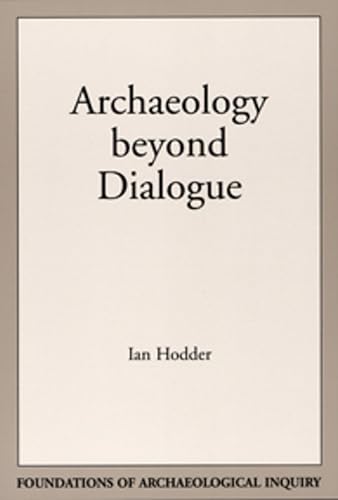Archaeology Beyond Dialogue (Foundations of Archaeological Inquiry) - Softcover

How do global trends affect our view of the past?
World trends such as tourism, diaspora, and media globalization have led to new forms of relationship with the past. Yet these global processes also threaten to silence local or alternate claims to that past. How should archaeologists respond to this dispersal of archaeological knowledge and interest? Many have come to accept the need for dialogue. In Archaeology Beyond Dialogue, Ian Hodder argues that there is a need to do more than engage in dialogue with participating communities; archaeologists must consider the implications of globalizing trends for the way they excavate and analyze their data.
Over the last two decades, Ian Hodder has been a central figure in archaeological method and theory arguing for reflexive techniques that are more transparent, dialogical, and participatory. He explores these developments by examining the diversification of archaeology, the effect of a more global archaeology on archaeological methods and analysis, new theoretical trends in social archaeology, and new interpretations of prehistoric sites focusing on agency, power/knowledge, and subject position. Hodder applies these concepts to the important site of Çatalhöyük in Turkey and the megaliths and monuments of the European Neolithic. He contrasts alternative approaches that claim, unsuccessfully in his view, to eschew meaning in the interpretation of the past.
This book should stir the archaeological community to a realization that it does not exist in a vacuum and that the part it plays affects many people: those with ancestral ties to the prehistoric inhabitants, those living in the general vicinity of the site, and the workers doing the excavation.
"synopsis" may belong to another edition of this title.
Ian Hodder is the Dunlevie Family Professor in the department of cultural and social anthropology at Stanford University, and fellow of the McDonald Institute for Archaeological Research at Cambridge University.
"About this title" may belong to another edition of this title.
- PublisherUniversity of Utah Press
- Publication date2004
- ISBN 10 0874807808
- ISBN 13 9780874807806
- BindingPaperback
- Edition number1
- Number of pages206
Buy New
Learn more about this copy
Shipping:
US$ 5.00
Within U.S.A.
Top Search Results from the AbeBooks Marketplace
Archaeology Beyond Dialogue (Foundations of Archaeological Inquiry)
Book Description Soft cover. Condition: New. 1st Edition. Seller Inventory # 012732
Archaeology Beyond Dialogue (Paperback)
Book Description Paperback. Condition: new. Paperback. How do global trends affect our view of the past?World trends such as tourism, diaspora, and media globalization have led to new forms of relationship with the past. Yet these global processes also threaten to silence local or alternate claims to that past. How should archaeologists respond to this dispersal of archaeological knowledge and interest? Many have come to accept the need for dialogue. In Archaeology Beyond Dialogue, Ian Hodder argues that there is a need to do more than engage in dialogue with participating communities; archaeologists must consider the implications of globalizing trends for the way they excavate and analyze their data.Over the last two decades, Ian Hodder has been a central figure in archaeological method and theory arguing for reflexive techniques that are more transparent, dialogical, and participatory. He explores these developments by examining the diversification of archaeology, the effect of a more global archaeology on archaeological methods and analysis, new theoretical trends in social archaeology, and new interpretations of prehistoric sites focusing on agency, power/knowledge, and subject position. Hodder applies these concepts to the important site of CatalhOEyUEk in Turkey and the megaliths and monuments of the European Neolithic. He contrasts alternative approaches that claim, unsuccessfully in his view, to eschew meaning in the interpretation of the past.This book should stir the archaeological community to a realization that it does not exist in a vacuum and that the part it plays affects many people: those with ancestral ties to the prehistoric inhabitants, those living in the general vicinity of the site, and the workers doing the excavation. WORLD TRENDS SUCH AS TOURISM, diaspora, and media globalization have led to new forms of relationship with the past. Yet these global processes also threaten to silence local or alternate claims to that past. How should archaeologists respond to this dispersal of archaeological knowledge and interest? While many have come to accept the need for dialogue, in "Archaeology Beyond Dialogue, Ian Hodder argues that there is a need to do more than engage in dialogue with participating communities. Archaeologists must consider the wider implications of globalizing trends for the way they excavate and analyze their data. Over the last two decades Ian Hodder has been a central figure in archaeological method and theory, arguing for reflexive techniques that are more transparent, dialogical, and participatory. He explores these developments by examining the diversification of archaeology, the effect of a more global archaeology on archaeological methods and analysis, new theoretical trends in social archaeology, and new interpretations of prehistoric sites focusing on agency, power/knowledge, and subject position. Hodder applies these concepts to the important site of atalhoyuk in Turkey and the megaliths and monuments of the European Neolithic. He contrasts alternative approaches that claim, unsuccessfully in his view, to eschew meaning in the interpretation of the past. This book should stir the archaeological community to a realization that it does not exist in a vacuum and that the part it plays affects many people: those with ancestral ties to the prehistoric inhabitants, those living in the general vicinity of a site, and die workers doing the excavation. Shipping may be from our UK warehouse or from our Australian or US warehouses, depending on stock availability. Seller Inventory # 9780874807806

